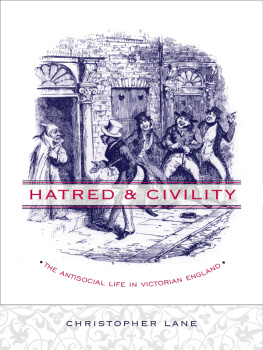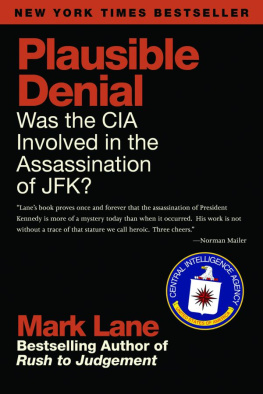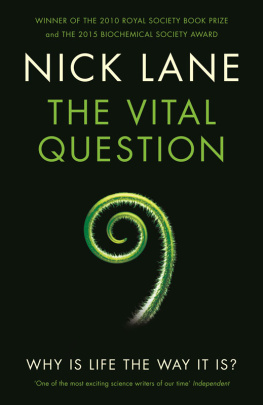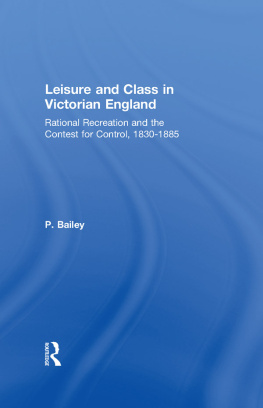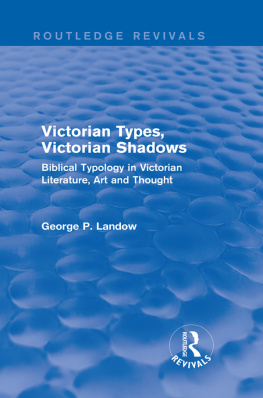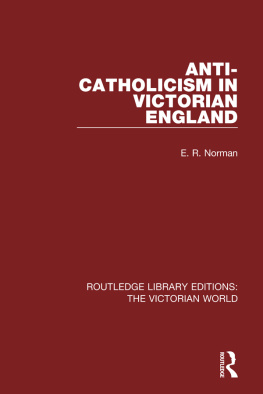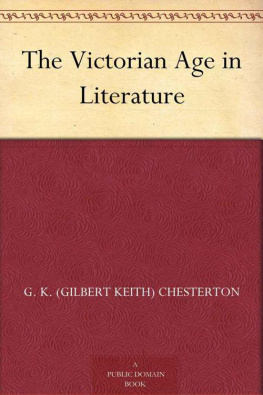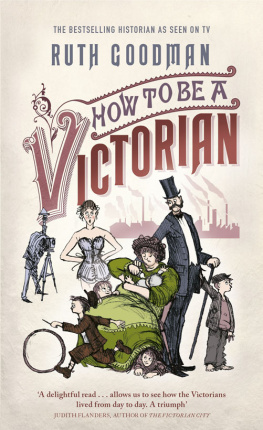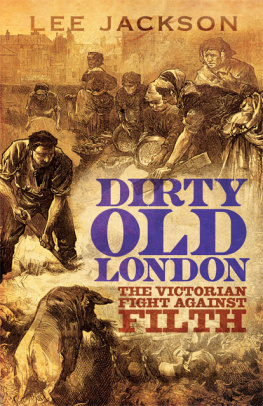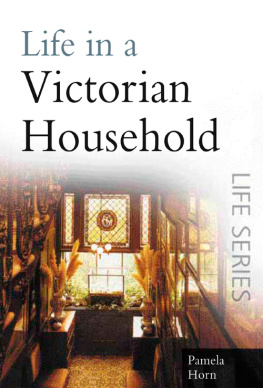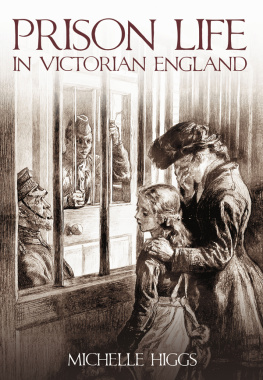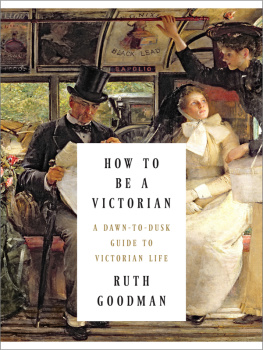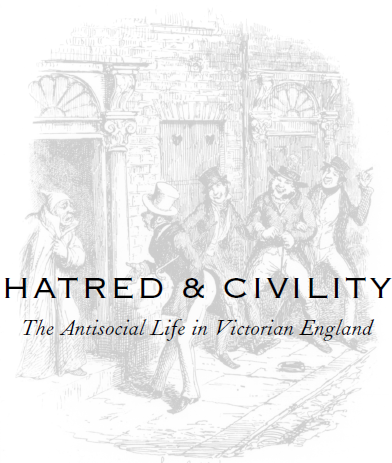HATRED & CIVILITY
CHRISTOPHER LANE
COLUMBIA UNIVERSITY PRESS New York
COLUMBIA UNIVERSITY PRESS
Publishers Since 1893
New York Chichester, West Sussex
cup.columbia.edu
The Northwestern University Research Grants Committee has provided partial support for the publication of this book. We gratefully acknowledge this assistance.
2004 Columbia University Press
All rights reserved
E-ISBN 978-0-231-50390-7
Library of Congress Cataloging-in-Publication Data
Lane, Christopher, 1966
Hatred and civility : the antisocial live in Victorian England / Christopher Lane.
p. cm.
Includes bibliographical references and index.
ISBN 0-231-13064-3 (acid-free paper)
1. English literature19th centuryHistory and criticism. n literature. 3. Literature and societyEnglandHistory19th century. 4. EnglandSocial life and customs19th century.HistoryVictoria, 18371901. 6. Alienation (Social psychology) in literature. 7. Interpersonal relations in literature. 8. Manners and customs in literature. 9. Courtesy in literature. 10. Hate in literature. I. Title.
PR468.M56L36 2004
823'.809353dc21
2003055146
A Columbia University Press E-book.
CUP would be pleased to hear about your reading experience with this e-book at .
These days we know less about the feeling of hatred than in times when man was more open to his destiny. These days subjects do not have to shoulder the burden of the experience of hatred in its most consuming forms. And why? Because our civilisation is itself sufficiently one of hatred. Isnt the path for the race to destruction really rather well marked out for us? Hatred is clothed in our everyday discourse under many guises, it meets with such extraordinarily easy rationalisations.
Jacques Lacan, The Seminar of Jacques Lacan, BOOK 1
CONTENTS
IN HIS BIOGRAPHY OF W. C. FIELDS, Robert Lewis Taylor repeats the saying that most persons harbor a secret affection for anybody with a low opinion of humanity. I trust the power of this maxim in thanking the following (few of them actually misanthropes) for their generous help: Mark Bauerlein, Leo Bersani, A. S. Byatt, Dane Claussen, Tim Dean, Michael A. Elliott, Jonathan Freedman, Christine Froula, Peter Gay, Judith Feher Gurewich, Barbara Hardy, Christopher Herbert, Daniel Karlin, Laura Kipnis, Jules Law, Deborah Luepnitz, Russell Maylone, Walt Reed, Michael Riley, and Oliver Sacks.
I am grateful to Jason K. Friedman and Jan McInroy for their copy-editing expertise, and to the University Research Council at Emory for a generous yearlong fellowship that aided my research. Thanks are also due my graduate students at Northwestern and Emoryespecially Jason Jones, who tracked down several sourcesand the many helpful librarians in the rare books collections at the British Library, the University of Chicago, Columbia, Emory, the University of Georgia, Harvard, the National Library of Scotland, the New York Public Library, Northwestern, and Yale. I am also grateful to the staffs at the Ashmolean Museum, Oxford; Glasgow University Librarys Special Collections; the Metropolitan Museum of Art, New York; Muses de Strasbourg; Northwestern Librarys Special Collections; the Pace/MacGill Gallery, New York; the Science and Society Picture Library and Victoria and Albert Museum Archives, London; and the University of WisconsinMadisons Special Collections for giving me permission to reprint several images.
The English departments at the University of Utah and Northwestern heard earlier versions of the Eliot and Bront chapters, respectively, and attendees at Harvards Humanities Center responded valuably to an earlier version of the Browning chapter, helping me sharpen several claims. Ronald Paulson and two readers at English Literary History guided publication of the Bront chapter, and Andrew Miller and three readers at Victorian Studies gave invaluable feedback on a slightly different version of the Bulwer chapter, also reprinted with permission. Generous funding from Northwesterns Graduate School and University Research Grants Committee defrayed the cost of reproducing the illustrations.
Two readers at Columbia Press offered excellent advice during the final stages of revision. Sincere thanks to them, to Juree Sondker and Anne McCoy at the press, and above all to Jennifer Crewe, my editor, who secured the reports, kept everything on time, and provided throughout unstinting encouragement and practical help.
John David Smith and my family in England offered the best kind of supportas well as reprieve from the material in this booksharing generous love and laughter in their own inimitable ways.
WHEN I BEGAN WRITING THIS BOOK, actors appeared nightly on U.S. television, warning viewers that hateful thoughts could lead to hate crimes, so watch what you say. Hate destroys.
A staple of American life before the terrorist attacks on September 11, 2001, these claims flourished while Americans enjoyed the longest period of peace and prosperity in more than two generations. Polled in December 1997, however, 57 percent of them believed that the people running the country dont really care what happens to you. If we can trust that figure, then collective happiness is neither a simple nor a logical effect of social harmony and increased wealth. Indeed, that greater prosperity can magnify incivility is a problem for politicians, cultural theorists, and writers tackling the social scene.
Journalists and scholars have made similar claims on the other side of the Atlantic, the principal focus of this book. In the British political magazine Prospect, expatriate Michael Elliott recently accused Rude Britannia of becoming rougher as it gets richer and of turning incivility into a real social problem. Given the above percentages about generalized anxiety, presumably this last definition is rather optimistic.
Let me stress at the outset: This book doesnt try to persuade people to behave better. It admits the difficulty of measuring, much less diminishing, antisocial behavior. And it shows that incivility predates the collapse of Britains empire, filling the very works of Victorian fiction and nonfiction that many still view as morally exemplary. Dickenss Our Mutual Friend, Eliots Daniel Deronda, and Trollopes The Way We Live Nowjust three of many exceptions to popular characterizations of the Victorians todaydont merely caution readers to settle for less while urging them to treat their spouses, neighbors, and relatives better. All three works advance bleaker explanations for rancor. Often deriving more pleasure from discord than from harmony, their characters view neighbors as severe obstacles to happiness and fulfillment. Allegedly schooling readers in good manners, these novels actually portray hatred in nearly insoluble forms. In this book I examine the resulting tension, calling it systemic, because it stems from impulses, emotions, and forms of rebellion that society cant integrate. I also challenge the myth that nineteenth-century England was simply a breeding ground for todays precarious civility. Indeed, if understanding antisocial behavior in contemporary Britain and the United States is truly our goal, then rereading Victorian fiction would be a good place to start.
Received wisdom about Victorian culture has, I think, blinded us to the range and intensity of its antisocial dynamics, including the cultural prevalence of acute misanthropy and schadenfreude (joy in anothers sorrow).

